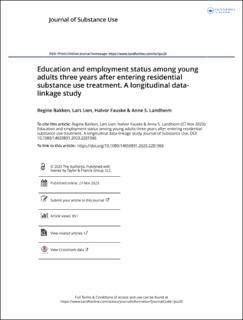Education and employment status among young adults three years after entering residential substance use treatment. A longitudinal data-linkage study
Peer reviewed, Journal article
Published version
Permanent lenke
https://hdl.handle.net/11250/3118554Utgivelsesdato
2023Metadata
Vis full innførselSamlinger
Sammendrag
Aims This study aims to investigate three-year follow-up among young adults who entered residential substance use disorder (SUD) treatment with regard to outcomes related to education, work and mortality. Methods Participants who entered residential SUD treatment between 2011 and 2016 aged 16–29 years were included in the study. In this study, we used data from the electronic health records of the treatment facility of the participants and linked these with data from nationwide registries. The data included de-identified, person-level information on patient demographics, crime, treatment use and socioeconomic factors. The primary outcome was education and employment status, analyzed using logistic regression. Results At the follow-up, two-fifths of the sample were in education or employment, half were receiving welfare benefits and the annual income level was low. 3.6% of the sample had died. Those who were in education or work were less likely to have post-treatment convictions and to use residential SUD treatment services than those who were not. Conclusion Being in education or employment and not engaging in crime or severe substance use can create a life situation that helps to sustain recovery. There is a need to establish SUD treatment for young adults that includes education- and employment-focused interventions. Education and employment status among young adults three years after entering residential substance use treatment. A longitudinal data-linkage study

